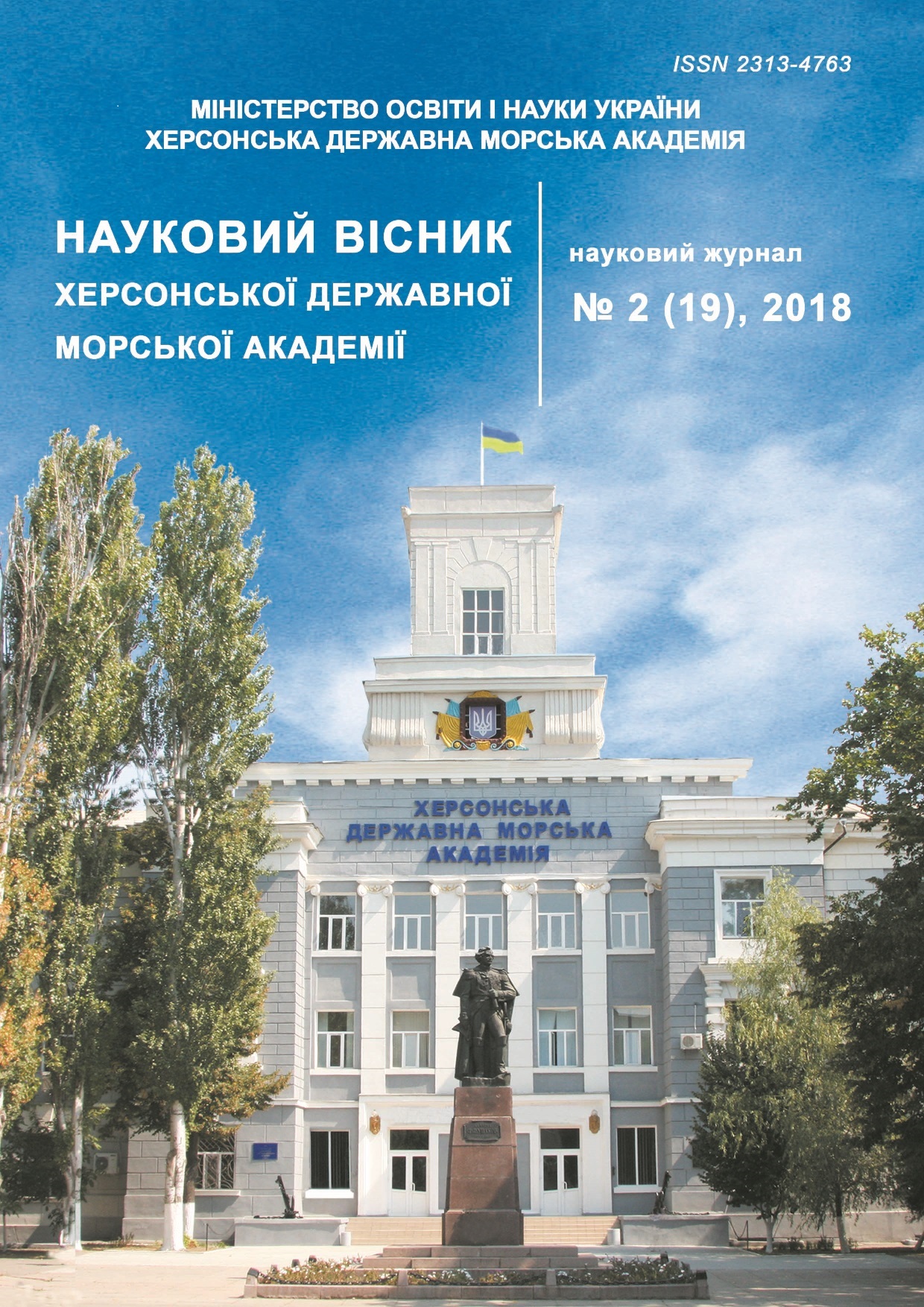THE SYSTEM ANALYSIS OF THE PSYCHOEMOTIONAL STATE OF THE MARITIME HIGH SCHOOL CADETS
Abstract
In this article there’s analyzed the psycho-emotional state of cadets of marine IHE. It is noted that the peculiarity of the psychology of cadets - sailors is directly related to the specifics of the job and to the fact that more money is paid for (in comparison with land). In many cases, although they know that the profession is difficult, they do not perceive how much. In some cases, young people choosing the maritime profession, when confronted with it, experience stress, which can turn into aggression. This transition is determined by the initial biological state of a person and the adaptation reserves of the body. It is noted that emotions, the psycho-emotional state of a person can be as an indicator of adaptation. Therefore, it had conducted the research in the work of the psycho-emotional state of the marine IHE cadets. A system analysis of the emotions formation has been carried out, and the special role of the asymmetry of the cerebral hemispheres into a certain type of emotion formed is shown. With a temporary shutdown of the left hemisphere, negative emotions arise - the mood becomes pessimistic. While it turn off the right - there is the opposite mood. This feature of the body’s response to arousal can be used to diagnose the emotional state of a person. Considering that achievement of success causes positive emotions, preliminary testing was conducted to determine the mood of the individual for the motivation to succeed and the need to achieve the goal.
It has determined that focused on achieving success 68% of cadets and 83% on achieving the goal. The average score on the test - the questionnaire «The need to achieve the goal» is 18 points, indicates an increased value of need. In terms of motivation for success -19 points - corresponds to a moderately high level of motivation. Given the results obtained, for the experimental diagnosis of the psycho-emotional state of the cadet, it can be used the research methodology, which is based on the motivation to achieve the goal with simultaneous analysis of the body’s response.
One of the regularities in the organization of neurophysiological processes with motivation and emotions is the asymmetry in the activity of the hemispheres of the cerebral cortex. Lateralization of the brain depends on the sign of emotions: with positive emotions, activation in the left frontal and anterior temporal areas prevails, with negative emotions dominate from right to left. To the asymmetry of the areas of the cortex allots of great functional importance. According to the level of asymmetry, we can assume individual differences in the emotional reactivity and temperament of a person, the tendency to depression, the type of emotional expression. It had proposed an experimental method for studying the psycho-emotional reaction of cadets to the determination of a stimulus when the body is excited. The following variables were used as dependent variables: probability of «hit» type - P (Hit), P (FA) - miss probability, sensory sensitivity indicator A, YesRate criterion severity index, reaction time for «hit» type responses (B).
It has been established that with the dominance of the right hemisphere of dominance, the action of irritants causes negative emotions that may contribute to the manifestation of aggression.
Thus, it is necessary to pay attention not only to the general health of the cadets, but also to determine their psycho-emotional state.
References
2. Зарипов Р. Н. Адаптация студентов в технологическом вузе: психологопедагогический аспект / Р. Н. Зарипов, И. Р. Зарипова // Вестник Казанского технологического университета. – 2011. – № 24. –С. 236–242.
3. Чигрина И. Ю. Проблема адаптации курсантов первого года обучения высших военных учебных заведений / И. Ю. Чигрина // Теория и практика общественного
развития. – 2014. – № 11. – С. 70–72.
4. Маленова А. Ю. Особенности социально-психологической адаптации курсантов к условиям обучения в военном вузе / А. Ю. Маленова, Б. Ш. Алимбаева. // Вестник Омского университета. Серия «Псилология». – 2016. – № 2. – С. 12–22.
5. Леухин О. Н. Проблема повышения качества профессиональной адаптации /
О. Н. Леухин // Социокультурные аспекты развития системы дополнительного профессионального образования. – Казань, 2004. – С. 325–333.
6. Кочегарова Н. А. Проблемы социально-психологической адаптации студентов-практикнтов, обучающихся по профилю «Кораблестроение и морская техника» и «Энергетические комплексы и оборудование морской техники» // Материалы VI студенческой Всероссиской научно-практической конференции (9 ноября 2016,
г. Астрахань). – С. 95–104.
7. Шадриков В. Д. Введение в психологию. Мотивация поведения /
В. Д. Шадриков. – М. : Логос, 2001. – 136 с.
8. Орлов Ю. М. Шкала оценки потребности в достижении / Ю.М. Орлов. Режим доступа: http://www.gurutestov.ru/test/152.
9. Симаева И. Н. Динамика эмоционально-чувственного состояния личности в процессе адаптации к деятельности : монография. – Калининград : Изд.-во Калинингр. ун-та. 2002. – 130 с.
10. Симаева И. Н. Гендерные особенности самосохранительного поведения студенческой молодежи / И. Н. Симаева, А. В. Чабанова, Е. В. Киреева // Проблемы педагогических наук. Материалы постоянных научных семинаров. – Калининград : КГУ, 2002. – С. 3–8.
11. Новиков В. А. Изучение функционального состояния человека по психо-физиологическим показателям / В. А. Новиков, В. Ф. Коваленко //Сучасні інформаційні та інноваційні технології на транспорті (MINTT-2012) : матеріали четвертої Міжнародної науково-практичної конференції. (29-31 травня 2012 р., м. Херсон). – Т. 2. – Херсон : ХДМА, 2012. – С.289–291.






